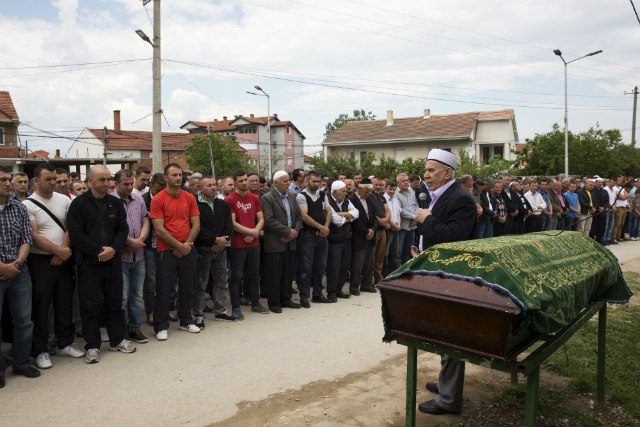SUMMARY
This is AI generated summarization, which may have errors. For context, always refer to the full article.

KUMANOVO, Macedonia (UPDATED) – Shooting broke out for a second day between police and gunmen in north Macedonia Sunday, May 10, as concern mounted in Europe over alleged ethnic-Albanian unrest that has left at least 22 people dead.
“Eight police officers were killed and 37 were injured” in gun battles in Kumanovo that began at dawn Saturday, May 9, police spokesman Ivo Kotevski told reporters, saying the assailants were from “a particularly dangerous terrorist group” whose members included people sought on international arrest warrants.
Following an offensive by security forces, Kotevski said 14 bodies were discovered at the site. “We can’t rule out we’ll find even more,” he added.
Kotevski said the group was made up of over 30 people, including a majority of Macedonian citizens and 5 presumed ethnic-Albanians from Kosovo and Albania.
A police operation in Kumanovo, some 40 kilometers (25 miles) north of Skopje launched at dawn Saturday was nearly over, Kotevski said, adding the “terrorist group that presented a threat was completely eliminated.”
Sporadic fire from automatic weapons could be heard overnight and on Sunday helicopters patrolled overhead, the state-run MIA news agency reported, citing witnesses.
“The situation on the ground is still very risky,” Interior Minister Dragana Jankuloska said late Saturday.
EU warns against escalation
As crisis-hit Macedonia declared two days of mourning Sunday, the European Union warned of the danger of escalating violence in a part of the country hit by an ethnic Albanian insurgency in 2001.
Ethnic Albanians make up around one quarter of Macedonia’s 2.1 million people.
Mindful of the 2001 insurgency and multiple wars earlier during the break-up of the former Yugoslavia, EU officials are particularly keen to prevent ethnically-driven violence from erupting in the heart of the continent again.
“Any further escalation must be avoided, not the least in the interest of the overall stability in the country,” EU enlargement commissioner Johannes Hahn said in a statement late Saturday.
The violence broke out Saturday when police moved in on the assailants, and met with what Jankuloska described as “violent resistance” from snipers, grenades and automatic weapons.
She said the gunmen were planning a “terrorist attack” on state institutions, and had accomplices in Kumanovo.
Media broadcast images of armored police vehicles deployed across Kumanovo, with officers clad in bullet-proof jackets.
On Saturday dozens of people, mostly women, children and the elderly, fled the besieged zone, some of them being evacuated by police, according to an Agence France-Presse photographer.
Police noted that “difficult terrain” was hampering the operation.
Calls for calm, dialogue
The incident comes less then 3 weeks after around 40 ethnic Albanians from neighboring Kosovo briefly seized control of a police station on Macedonia’s northern border, demanding the creation of an Albanian state in Macedonia.
Both Albania and Kosovo, as well as Macedonia’s ethnic Albanian junior ruling party DUI, strongly condemned Saturday’s clashes and called for calm.
In Tirana, the foreign ministry issued a statement calling for restraint “to prevent further deterioration of the situation which is not in favor of Macedonia’s democratic stability and prosperity.”
Pristina echoed that by imploring “all sides to find a solution through a political dialogue.”
Serbia sent additional forces to its border with both Kosovo and Macedonia, state-run Tanjug news agency reported.
The 2001 Macedonian conflict ended with an agreement providing more rights to the community, but ties between ethnic Macedonians and Albanians remain strained.
The violence in Kumanovo erupted amid political tension in Macedonia, where the government and center-left opposition have been trading accusations including claims of wiretapping and million-euro bribes.
The crisis has not only undermined Macedonia’s already weak institutions, but also sparked concerns within the 28-nation European Union that Skopje hopes to join.
The US embassy in Skopje this weekend issued a statement expressing condolences “to the families of the people killed and to those injured.” – Robert Atanasovski and Jasmina Mironski in Skopje, AFP/Rappler.com
Add a comment
How does this make you feel?
There are no comments yet. Add your comment to start the conversation.